To brew soothing golden turmeric tea at home, start with high-quality turmeric powder or fresh root. Combine it with black pepper to enhance absorption, and add ginger for extra warmth and digestive benefits. Heat your mixture with water or milk, avoiding boiling to preserve nutrients. Customize with cinnamon, cardamom, or honey for added flavor and health perks. Steep for 5-10 minutes, then strain and serve. You can enjoy it hot or iced, depending on your preference. Remember to store any leftover tea properly to maintain freshness. With these simple steps, you're on your way to mastering this golden elixir.
Key Takeaways
- Combine turmeric powder, black pepper, and milk in a saucepan, heating gently to enhance absorption and color.
- Add optional ingredients like honey, ginger, or cinnamon for customized flavor and health benefits.
- Steep the mixture for 5-10 minutes at 175-185°F for optimal extraction of beneficial compounds.
- Strain the tea using a fine-mesh strainer or cheesecloth for a smooth texture.
- Serve in clear glass mugs and garnish with fresh ginger, cinnamon, or lemon for added flavor and presentation.
Benefits of Turmeric Tea
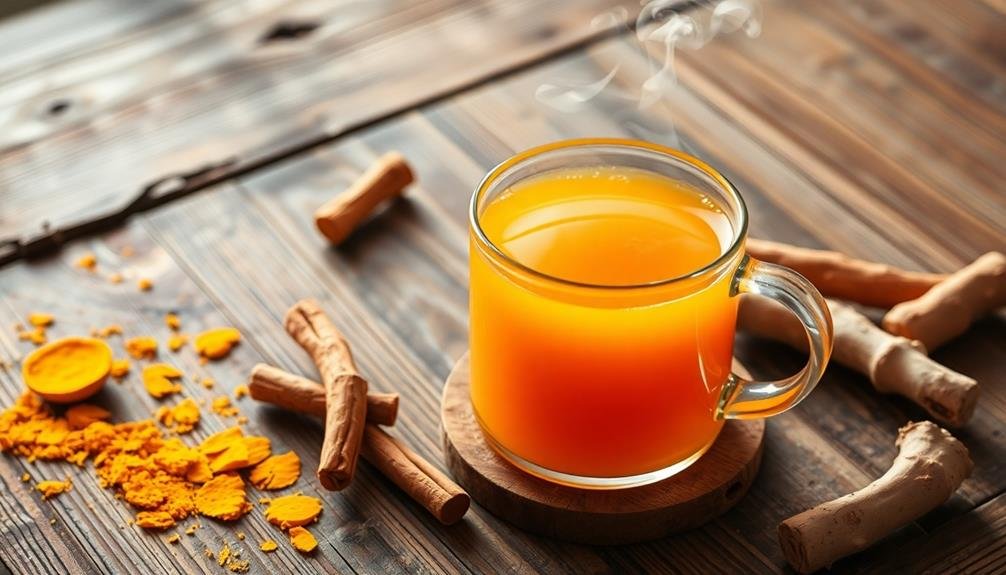
Thanks to its potent anti-inflammatory properties, turmeric tea offers a range of health benefits. When you drink this golden elixir regularly, you're giving your body a powerful antioxidant boost. Curcumin, the active compound in turmeric, helps fight free radicals and may reduce the risk of chronic diseases.
You'll find that turmeric tea can support your digestive health by stimulating bile production and reducing bloating. It's also known to aid in weight management by increasing metabolism and helping to regulate blood sugar levels. If you're dealing with joint pain or arthritis, the anti-inflammatory effects of turmeric tea may provide relief.
Your brain health can benefit too. Studies suggest that curcumin may improve memory and reduce the risk of neurodegenerative diseases like Alzheimer's. Turmeric tea can also boost your immune system, helping you ward off colds and flu. It's particularly effective when combined with black pepper, which enhances curcumin absorption.
For those concerned about heart health, turmeric tea may help lower cholesterol levels and improve circulation. It's also been linked to better skin health, promoting a natural glow and potentially reducing acne.
Essential Ingredients
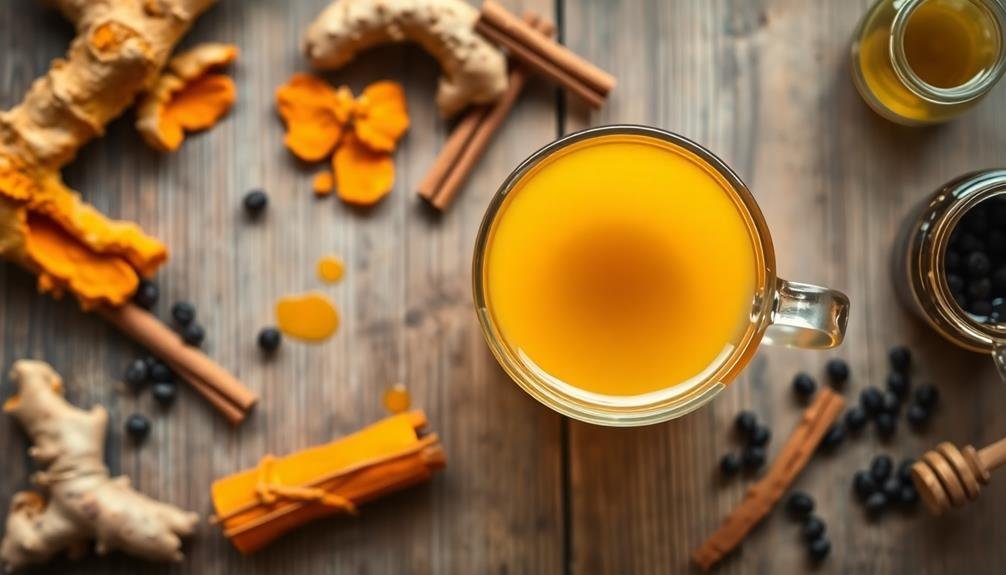
To make a comforting cup of golden turmeric tea, you'll need a few key spices and herbs.
Start with ground turmeric as your base, then add black pepper to enhance absorption and ginger for extra warmth.
You can also incorporate optional flavor enhancers like cinnamon, cardamom, or honey to customize your brew to your liking.
[DIRECTIONS]:
Key Spices and Herbs
The heart of any golden turmeric tea lies in its carefully selected spices and herbs. You'll want to focus on ingredients that not only enhance the flavor but also contribute to the tea's soothing properties.
Start with high-quality ground turmeric, the star of the show, known for its anti-inflammatory benefits. Pair it with freshly grated ginger to add a spicy kick and aid digestion.
For added depth and warmth, consider including these key spices and herbs:
- Cinnamon: Adds sweetness and helps regulate blood sugar
- Black pepper: Enhances turmeric absorption
- Cardamom: Provides a subtle, aromatic flavor
- Cloves: Offer antioxidant properties and a rich taste
- Star anise: Imparts a licorice-like flavor and supports digestion
Don't be afraid to experiment with different combinations to find your perfect blend. You might also try adding a pinch of nutmeg or a few strands of saffron for a luxurious touch.
Remember, the quality of your spices can make or break your tea, so opt for fresh, organic ingredients whenever possible.
With these key spices and herbs, you'll create a comforting and flavorful golden turmeric tea that's as nutritious as it's delicious.
Optional Flavor Enhancers
While the key spices and herbs form the foundation of golden turmeric tea, you can elevate its flavor profile with optional enhancers. Consider adding a touch of honey or maple syrup to balance the earthy notes with natural sweetness. For a creamier texture, you can't go wrong with a splash of plant-based milk like coconut, almond, or oat milk. These additions not only enhance the flavor but also create a more indulgent experience.
If you're looking to boost the antioxidant content, try incorporating a few drops of lemon juice. The citrus notes will brighten the overall taste and help your body absorb the curcumin in turmeric more effectively. For a spicier kick, add a pinch of cayenne pepper or a few cracks of freshly ground black pepper. These not only provide warmth but also increase the bioavailability of turmeric's beneficial compounds.
Experiment with aromatic enhancers like vanilla extract, rose water, or a dash of cardamom for a unique twist. You can also try steeping a bag of chamomile or rooibos tea alongside your golden turmeric blend for added complexity and relaxation benefits.
Choosing High-Quality Turmeric
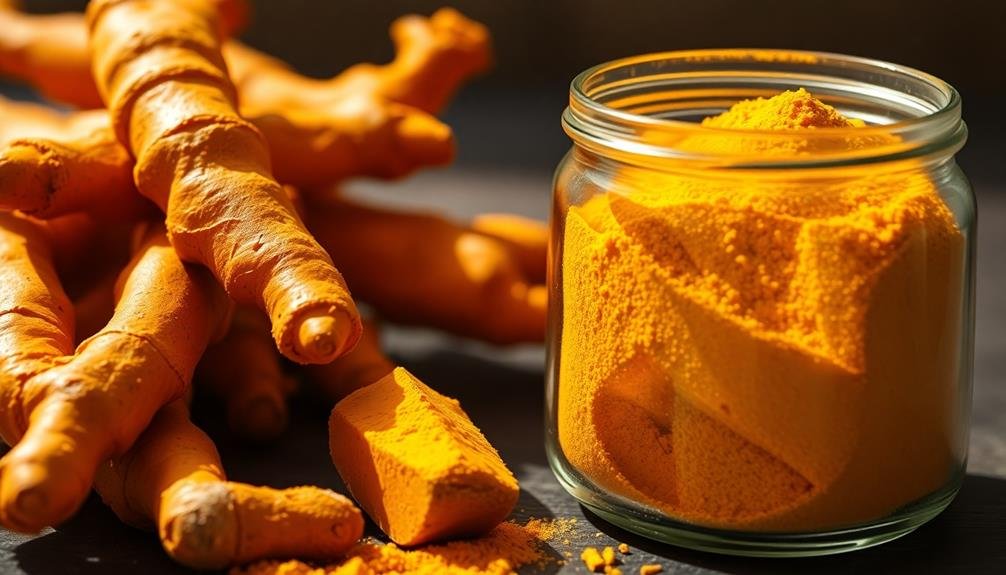
Selecting high-quality turmeric is essential for maximizing the health benefits and flavor of your golden tea. When shopping for turmeric, look for organic, non-irradiated options to guarantee you're getting the most potent and pure form of this powerful spice. Fresh turmeric root is ideal, but if you're using powdered turmeric, choose a brand that's known for its quality and purity.
To identify high-quality turmeric, consider these factors:
- Color: Look for a deep, vibrant orange-yellow hue
- Aroma: Fresh turmeric should have a strong, earthy scent
- Texture: Powder should be fine and not clumpy
- Source: Choose turmeric from reputable regions like India or Sri Lanka
- Packaging: Opt for airtight, light-resistant containers
When possible, buy turmeric from specialty spice shops or health food stores that prioritize quality. Don't be afraid to ask about the turmeric's origin and processing methods.
If you're using fresh turmeric root, select pieces that are firm and free from soft spots or mold. Store your turmeric properly to maintain its potency – keep it in a cool, dry place away from direct sunlight.
Black Pepper's Synergistic Effect
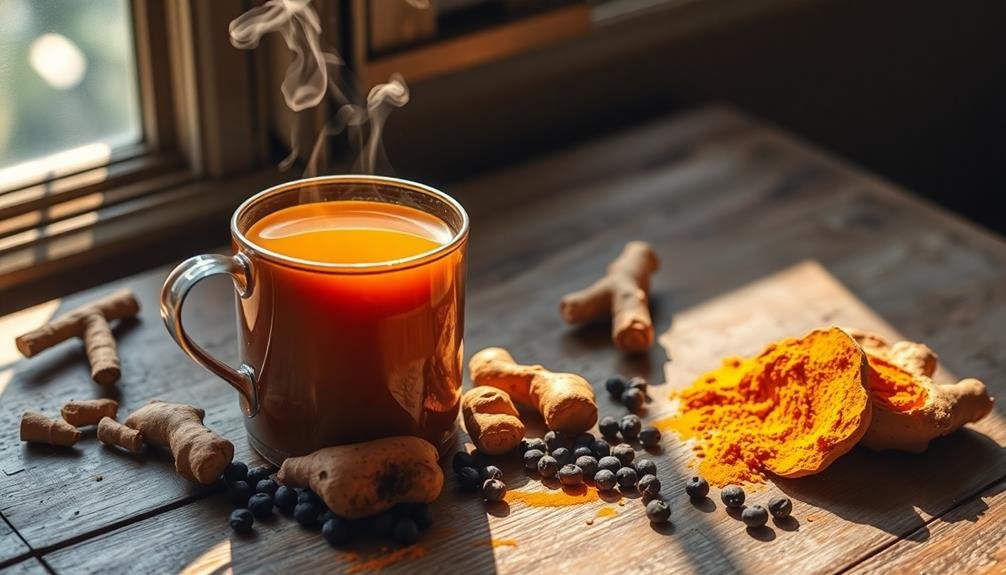
You'll want to add black pepper to your turmeric tea for more than just flavor.
Black pepper contains piperine, a compound that considerably enhances your body's absorption of curcumin, the active ingredient in turmeric.
Enhancing Curcumin Absorption
Turmeric's star compound, curcumin, offers powerful anti-inflammatory benefits, but it's notoriously difficult for the body to absorb.
To maximize curcumin's potential, you'll need to enhance its bioavailability. Black pepper contains piperine, which considerably boosts curcumin absorption. When you combine these two ingredients, you're creating a synergistic effect that can increase curcumin absorption by up to 2000%.
To further improve curcumin absorption, consider these strategies:
- Add healthy fats like coconut oil or ghee to your turmeric tea
- Consume turmeric with quercetin-rich foods like apples or onions
- Include fermented foods in your diet to support gut health
- Try liposomal turmeric supplements for enhanced delivery
- Experiment with turmeric-infused golden milk recipes
Piperine's Bioavailability Boost
Black pepper's role in enhancing turmeric's benefits can't be overstated. The key to this synergy lies in piperine, the compound responsible for black pepper's pungent taste.
When you add a pinch of black pepper to your turmeric tea, you're not just enhancing its flavor; you're greatly boosting the bioavailability of curcumin, turmeric's active ingredient.
Piperine works by inhibiting certain enzymes in your liver and intestines that normally break down curcumin. This inhibition allows more curcumin to enter your bloodstream, increasing its absorption by up to 2000%. You'll get more bang for your buck from the same amount of turmeric.
Additionally, piperine enhances the absorption of other beneficial compounds and nutrients, making your turmeric tea even more potent.
To maximize these benefits, add a small amount of freshly ground black pepper to your turmeric tea. Aim for about 1/4 teaspoon of ground black pepper per cup of tea.
If you find the taste too strong, start with less and gradually increase the amount. Remember, a little goes a long way in boosting curcumin's bioavailability and revealing turmeric's full potential.
Selecting the Right Sweetener
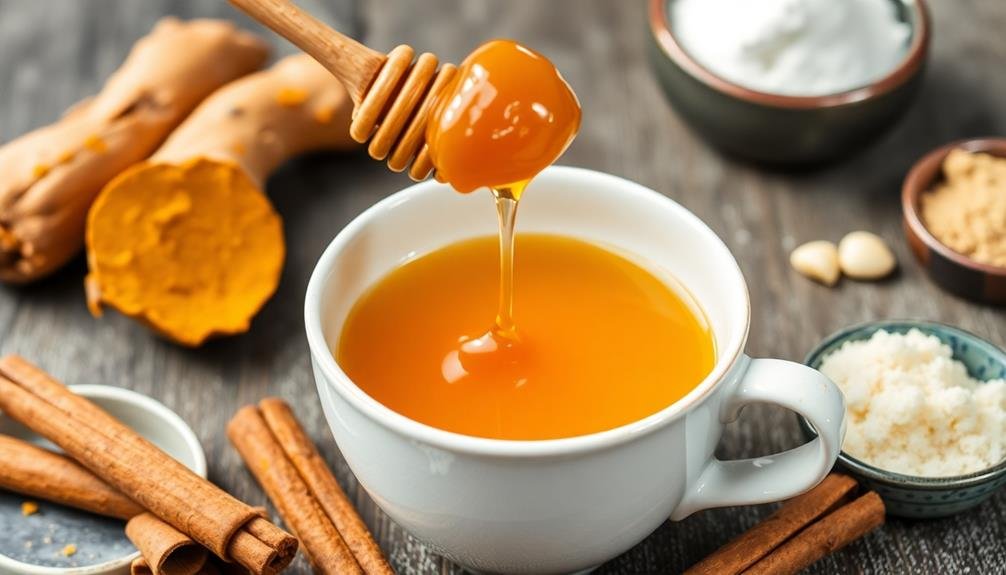
Selecting the right sweetener for your golden turmeric tea can enhance its flavor profile and complement its earthy notes. You'll want to choose a sweetener that doesn't overpower the delicate balance of spices while still providing a pleasant level of sweetness.
Consider natural options that offer additional health benefits to complement turmeric's anti-inflammatory properties.
Here are some excellent sweetener choices for your golden turmeric tea:
- Raw honey: Offers antimicrobial properties and a rich flavor
- Maple syrup: Provides a subtle sweetness with trace minerals
- Coconut sugar: Has a lower glycemic index and caramel-like taste
- Stevia: A zero-calorie option for those watching their sugar intake
- Dates: Blend soaked dates for a natural, fiber-rich sweetener
When adding your chosen sweetener, start with a small amount and adjust to taste.
Remember that some sweeteners, like honey, can lose their beneficial properties if added to boiling water. It's best to let your tea cool slightly before stirring in your sweetener.
You'll find that the right sweetener can transform your golden turmeric tea into a comforting and delicious beverage you'll look forward to drinking regularly.
Optional Spice Additions
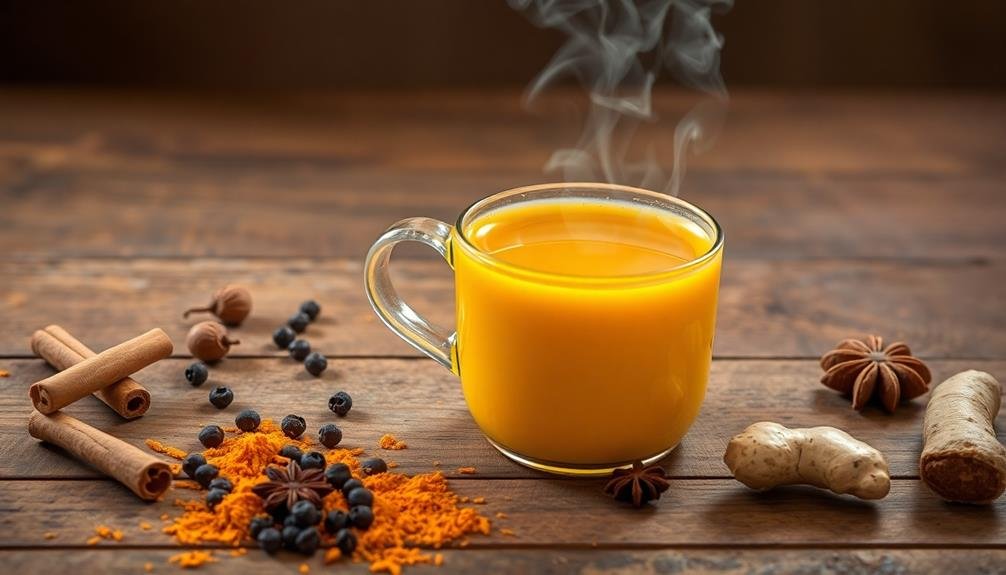
You can enhance your turmeric tea with complementary spices to create a more complex flavor profile.
Consider adding a pinch of cinnamon and cardamom for warmth and depth.
For an extra kick and to boost turmeric's absorption, you'll want to include a dash of freshly ground black pepper.
Cinnamon and Cardamom
Spice enthusiasts can elevate their golden turmeric tea by adding cinnamon and cardamom. These aromatic spices complement turmeric's earthy flavor, creating a more complex and satisfying beverage. Cinnamon adds warmth and sweetness, while cardamom contributes a subtle, exotic note.
To incorporate these spices into your turmeric tea:
- Add a small cinnamon stick or 1/4 teaspoon of ground cinnamon to your tea mixture
- Crush 2-3 cardamom pods and add them to the brew
- Experiment with the ratios to find your preferred balance of flavors
- Consider using a spice grinder for freshly ground spices
- Steep the spices along with your turmeric and other ingredients
You'll find that cinnamon and cardamom not only enhance the taste but also offer additional health benefits. Cinnamon is known for its anti-inflammatory properties and potential to regulate blood sugar levels.
Cardamom, rich in antioxidants, may aid digestion and freshen breath.
When brewing your spiced turmeric tea, remember that a little goes a long way. Start with small amounts and adjust to your taste preferences.
You'll soon discover a perfect blend that soothes your senses and nourishes your body.
Black Pepper Boost
A pinch of black pepper can greatly enhance your golden turmeric tea experience. This seemingly simple addition plays an essential role in boosting the absorption of curcumin, the active compound in turmeric responsible for its health benefits.
When you add black pepper to your turmeric tea, you're increasing the bioavailability of curcumin by up to 2000%. Black pepper contains piperine, a compound that inhibits the breakdown of curcumin in the liver and intestines. This allows more curcumin to enter your bloodstream, maximizing its potential anti-inflammatory and antioxidant effects.
To incorporate black pepper into your turmeric tea, simply add a few freshly ground peppercorns or a small pinch of ground black pepper to your brew.
You'll find that black pepper adds a subtle warmth and complexity to the flavor profile of your golden turmeric tea. It complements the earthy notes of turmeric and balances the sweetness of any honey or other sweeteners you might use.
If you're sensitive to spice, start with just a tiny amount and gradually increase to find your perfect balance.
Preparing the Base Mixture
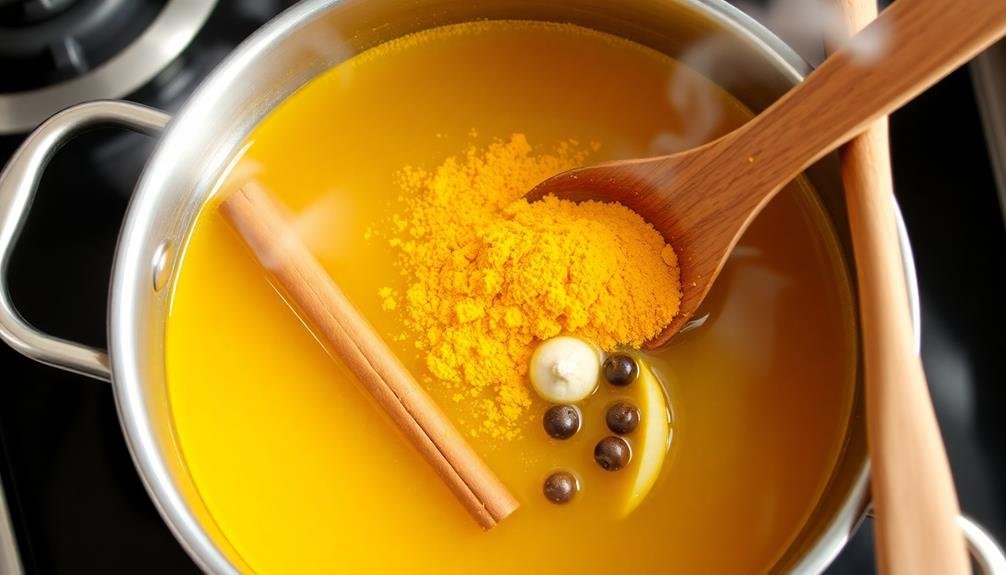
To begin preparing the base mixture for your soothing golden turmeric tea, gather the essential ingredients: turmeric powder, black pepper, and your choice of milk.
In a small saucepan, combine one cup of milk with a teaspoon of turmeric powder and a pinch of freshly ground black pepper. Whisk the mixture thoroughly to guarantee the turmeric is well-distributed and there are no clumps.
Place the saucepan over medium heat and gently warm the mixture, stirring occasionally. Don't let it boil; you're aiming for a comfortably warm temperature.
As you heat the base, you'll notice the vibrant golden color intensifying. This process helps to activate the beneficial compounds in turmeric and enhance their absorption.
Here are some tips to customize your turmeric tea base:
- Add a teaspoon of honey or maple syrup for natural sweetness
- Include a small piece of fresh ginger for extra warmth and flavor
- Try coconut milk for a rich, tropical twist
- Sprinkle in a dash of cinnamon for a comforting aroma
- Experiment with almond or oat milk for a plant-based option
Once your base mixture is warm and well-combined, it's ready for the next step in creating your soothing golden turmeric tea.
Steeping Methods for Best Results
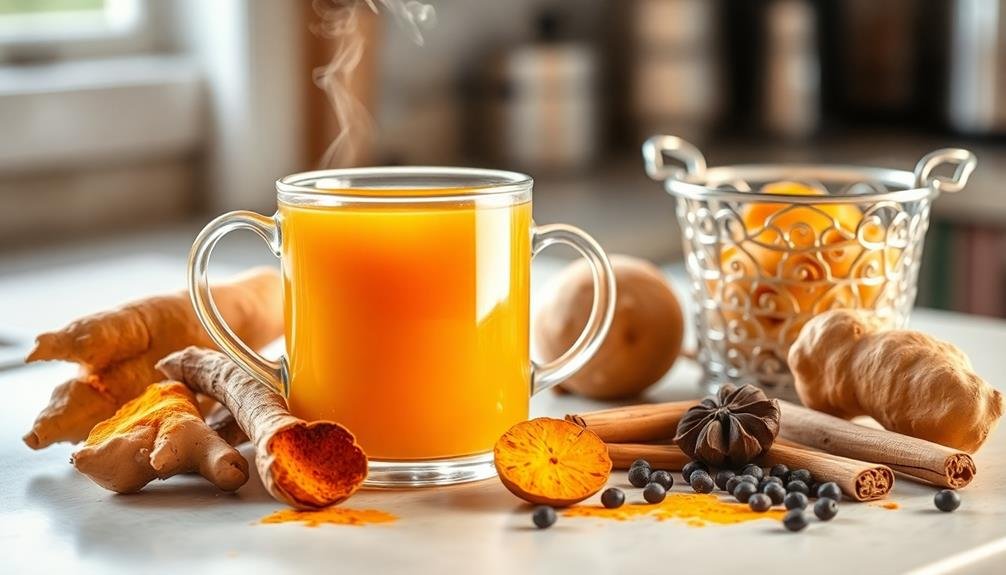
While your base mixture is ready, proper steeping techniques can elevate your golden turmeric tea to new heights. To achieve the best flavor and health benefits, consider these steeping methods:
- Hot Water Steeping: Pour hot water (not boiling) over your turmeric mixture and let it steep for 5-10 minutes. This method extracts most of the beneficial compounds quickly.
- Cold Brew: Mix the turmeric blend with cold water and refrigerate for 8-12 hours. This gentle extraction preserves delicate flavors and may reduce bitterness.
- Sun Tea: Place your mixture in a glass jar with room temperature water and let it sit in direct sunlight for 2-4 hours. This method infuses a subtle warmth into the tea.
| Steeping Method | Time | Temperature |
|---|---|---|
| Hot Water | 5-10 min | 175-185°F |
| Cold Brew | 8-12 hrs | 34-40°F |
| Sun Tea | 2-4 hrs | Ambient |
| Simmering | 10-15 min | 185-195°F |
For maximum potency, you can also try simmering the mixture on low heat for 10-15 minutes. Whichever method you choose, strain the tea before drinking and adjust the steeping time to suit your taste preferences.
Straining and Serving Techniques
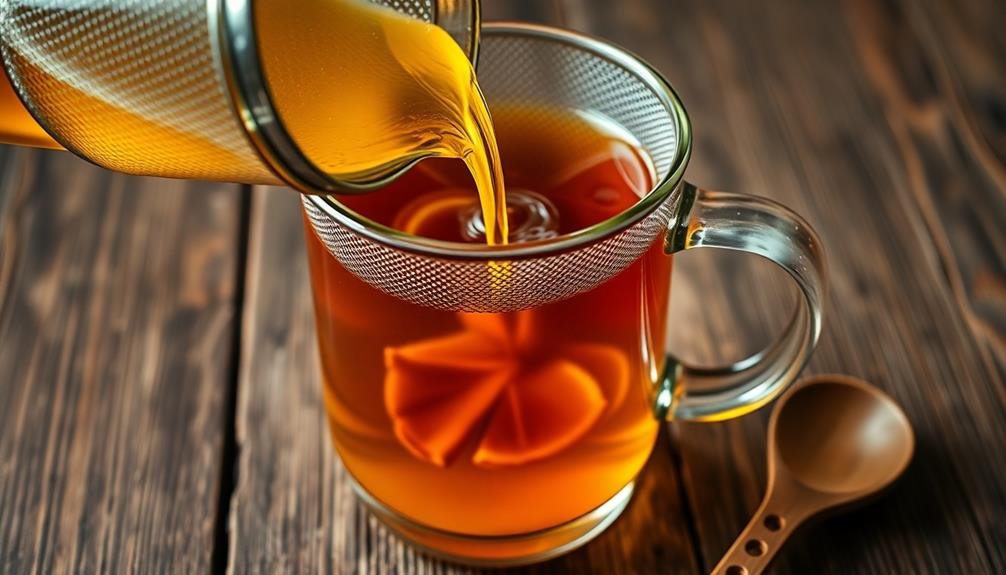
Once you've steeped your golden turmeric tea to perfection, it's time to focus on straining and serving. Use a fine-mesh strainer or cheesecloth to remove any solid particles, ensuring a smooth, silky texture. Pour the tea slowly to prevent splashing and maintain its rich golden color.
For an elegant presentation, serve your turmeric tea in clear glass mugs or teacups to showcase its vibrant hue. If you'd like to add a personal touch, consider these garnishing options:
- A thin slice of fresh ginger
- A sprinkle of ground cinnamon
- A twist of lemon peel
- A few fresh mint leaves
- A drizzle of honey on top
To enhance the tea's flavor and health benefits, you can stir in a small amount of coconut oil or black pepper. These additions not only boost the taste but also increase the bioavailability of curcumin, the active compound in turmeric.
Remember to serve your golden turmeric tea warm, as it's most enjoyable and beneficial at this temperature. If you've made extra, store it in an airtight container in the refrigerator for up to 48 hours, reheating gently when ready to serve.
Customizing Flavor Profiles
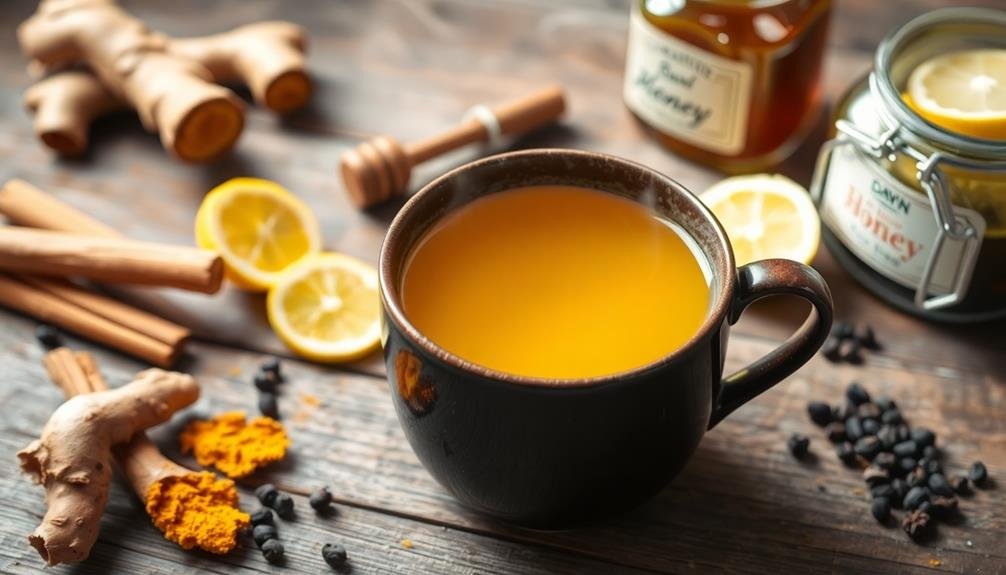
Flavor experimentation is key to creating your perfect golden turmeric tea. Start with the base recipe and adjust ingredients to suit your taste preferences.
If you enjoy a spicier brew, increase the amount of ginger or add a pinch of black pepper, which also enhances turmeric absorption. For a sweeter profile, try adding a teaspoon of honey or maple syrup.
Experiment with different plant-based milk options to alter the creaminess and flavor. Coconut milk adds a tropical twist, while almond milk provides a nutty undertone.
If you prefer a more robust tea flavor, reduce the amount of milk or omit it entirely.
Consider incorporating complementary herbs and spices. Cinnamon adds warmth and natural sweetness, while cardamom offers a unique, aromatic complexity.
For a citrusy kick, squeeze in some fresh lemon juice or add a few drops of orange essence.
Don't be afraid to mix in other beneficial ingredients like ashwagandha powder for stress relief or a dash of cayenne pepper for an extra metabolic boost.
Remember to start with small additions and adjust gradually to find your ideal flavor balance.
Hot vs. Iced Turmeric Tea
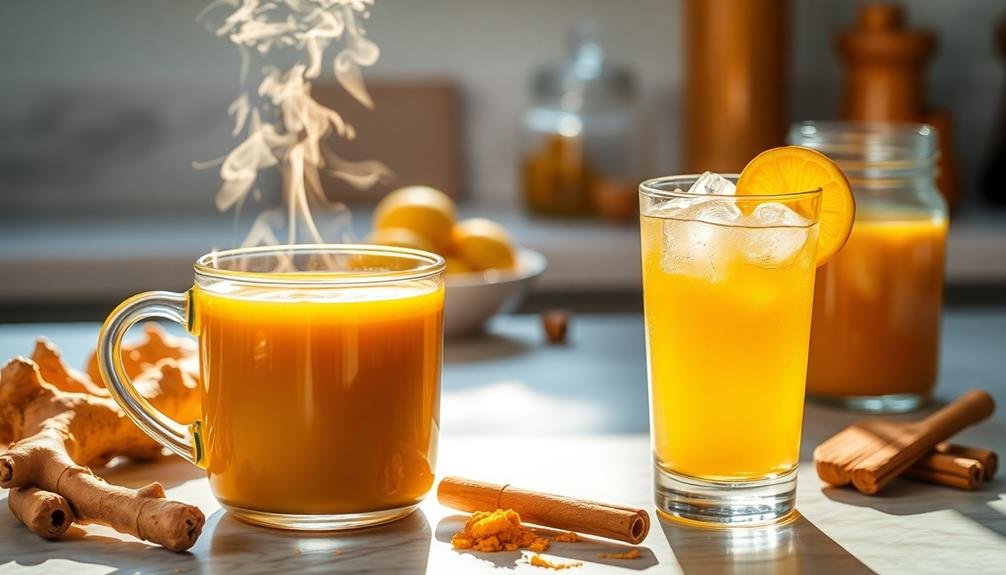
Golden turmeric tea isn't limited to just one serving temperature. You can enjoy it both hot and iced, each offering a unique experience.
Hot turmeric tea provides a comforting warmth, perfect for chilly days or when you're feeling under the weather. It's also ideal for maximizing the absorption of curcumin, turmeric's active compound.
Iced turmeric tea, on the other hand, offers a revitalizing alternative for warmer days or post-workout hydration.
When preparing hot turmeric tea, steep your ingredients in boiling water for 5-10 minutes. For iced tea, brew a stronger concentration and pour over ice. You can also make a large batch and refrigerate it for later use. Both versions can be customized with various ingredients to suit your taste preferences.
Here are some key differences between hot and iced turmeric tea:
- Hot tea has a more intense flavor profile
- Iced tea is more invigorating and thirst-quenching
- Hot tea may offer better curcumin absorption
- Iced tea can be easily stored for later consumption
- Hot tea is traditionally consumed in many cultures for its medicinal properties
Experiment with both serving styles to find your preferred method of enjoying this golden elixir.
Storage and Shelf Life

Proper storage is essential to maintain the freshness and potency of your turmeric tea. If you've prepared a larger batch, store it in an airtight container in the refrigerator for up to 3-4 days. Before consuming, give it a good shake as some ingredients may settle at the bottom.
For longer shelf life, you can freeze the tea in ice cube trays and thaw as needed.
When it comes to dry ingredients, store your turmeric powder in a cool, dark place away from direct sunlight and moisture. An airtight container or spice jar is ideal. Properly stored, ground turmeric can last up to 3-4 years. However, it's best to use it within a year for best flavor and effectiveness.
Whole turmeric root can be stored in the refrigerator for up to two weeks. Wrap it in a paper towel and place it in a plastic bag before refrigerating.
For pre-made turmeric tea bags, check the expiration date on the package. Generally, they'll stay fresh for about 18-24 months when stored in a cool, dry place.
Always verify your storage containers are clean and dry to prevent mold growth.
Precautions and Potential Side Effects
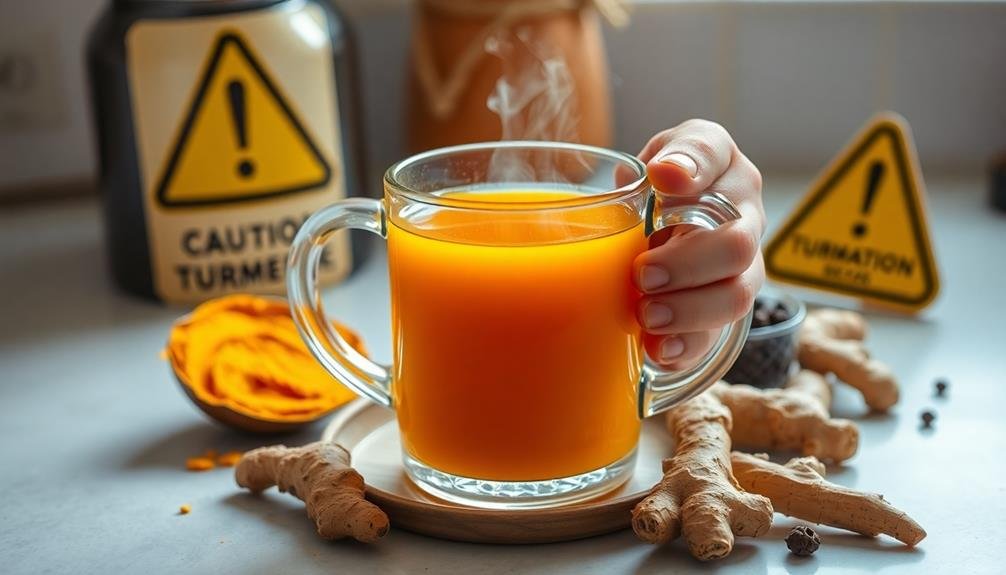
While turmeric tea offers numerous health benefits, it's important to be aware of potential side effects and necessary precautions. Some people may experience digestive issues, such as nausea or diarrhea, especially when consuming large amounts.
If you're prone to kidney stones, be cautious as turmeric contains oxalates, which can contribute to their formation.
Turmeric can interact with certain medications, so consult your doctor before incorporating it into your routine, especially if you're taking:
- Blood thinners
- Diabetes medications
- Stomach acid reducers
- Iron supplements
- Chemotherapy drugs
Pregnant and breastfeeding women should limit their intake of turmeric tea, as its effects on fetal development and nursing infants aren't fully understood.
If you have gallbladder problems, turmeric may worsen symptoms by stimulating bile production.
In rare cases, some individuals may experience allergic reactions to turmeric. If you notice any signs of an allergic response, such as hives, difficulty breathing, or swelling of the face or throat, discontinue use immediately and seek medical attention.
Frequently Asked Questions
Can Pregnant Women Safely Drink Turmeric Tea?
You're generally safe to drink turmeric tea while pregnant, but it's best to consult your doctor first. Moderate amounts are usually fine, but excessive consumption might affect your pregnancy. Always prioritize your healthcare provider's advice.
How Does Turmeric Tea Affect Medication Absorption?
You should be cautious when drinking turmeric tea with medications. It can affect how your body absorbs certain drugs, potentially increasing or decreasing their effectiveness. Always consult your doctor before combining turmeric tea with any medications you're taking.
Is It Possible to Use Turmeric Powder Instead of Fresh Turmeric Root?
Yes, you can use turmeric powder instead of fresh root. It's convenient and widely available. You'll get similar benefits, though fresh root may have a stronger flavor. Just add about 1/4 teaspoon of powder per cup.
Can Turmeric Tea Stain Teeth or Dental Work?
Yes, turmeric tea can stain your teeth and dental work. It's known for its vibrant yellow color, which can leave temporary or permanent stains. You'll want to rinse your mouth after drinking or use a straw to minimize contact.
How Long Does It Take to See Health Benefits From Drinking Turmeric Tea?
You'll likely notice some benefits within a few weeks of regular consumption. However, it can take 2-3 months to see significant changes. Consistency is key, so try to drink turmeric tea daily for best results.
In Summary
You've now mastered the art of brewing golden turmeric tea at home. With its numerous health benefits and customizable flavors, it's a soothing addition to your daily routine. Remember to use high-quality ingredients, experiment with different flavor profiles, and enjoy it hot or iced. Don't forget to store your tea properly and be aware of potential side effects. So go ahead, sip, and savor your homemade turmeric tea!

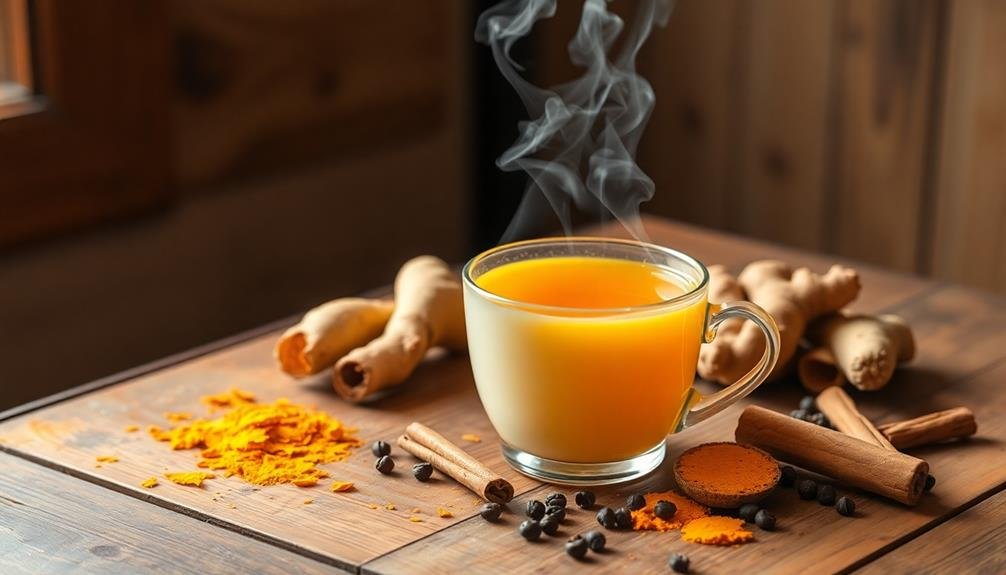


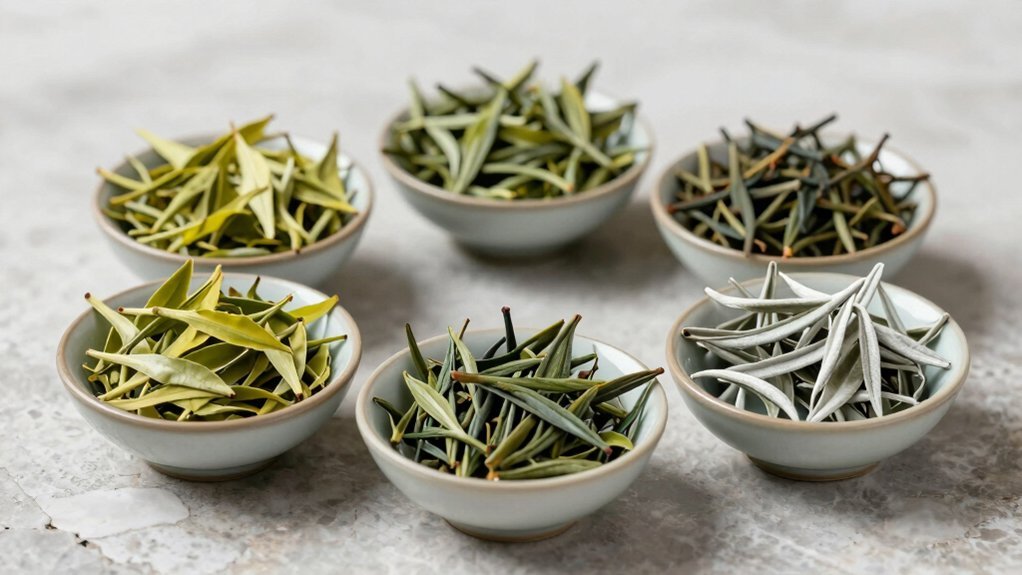
Leave a Reply